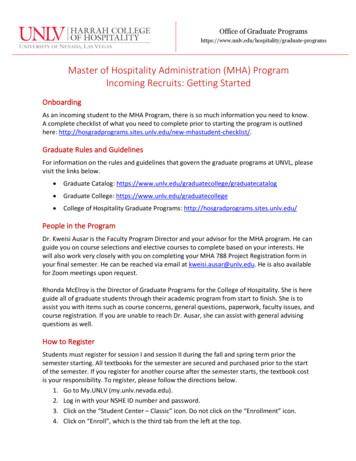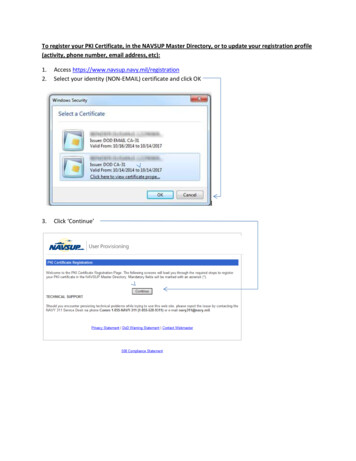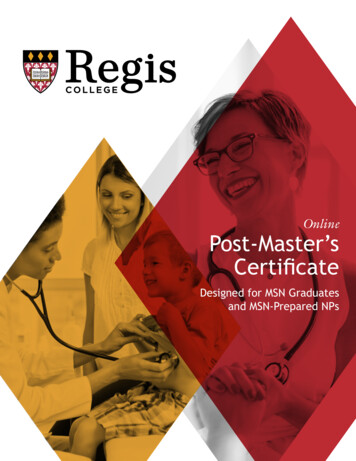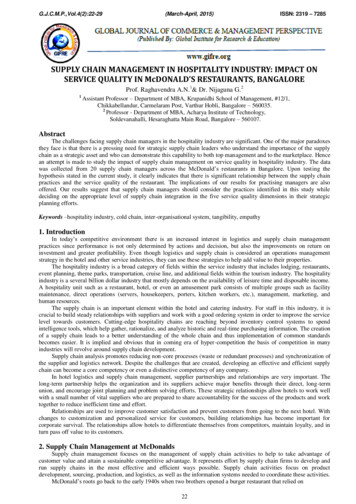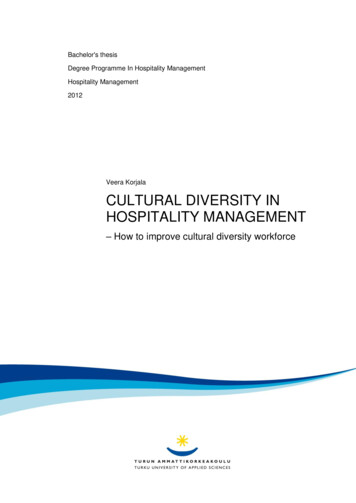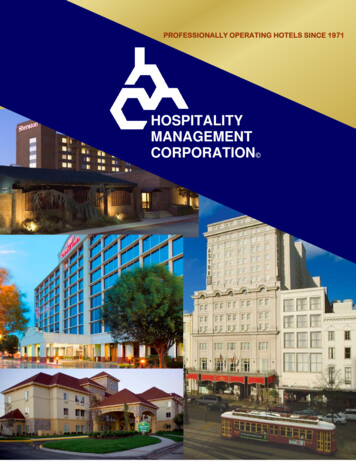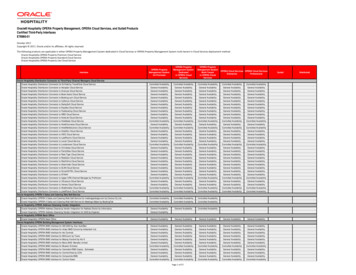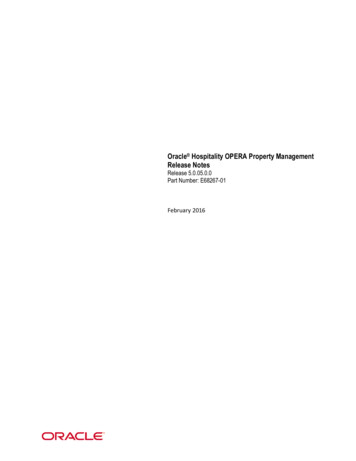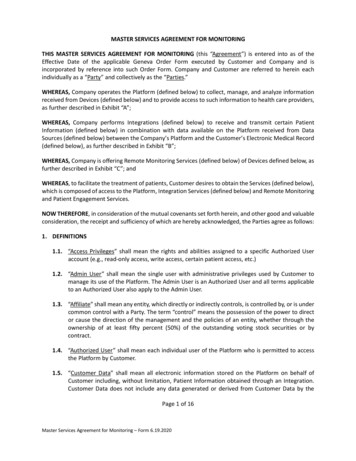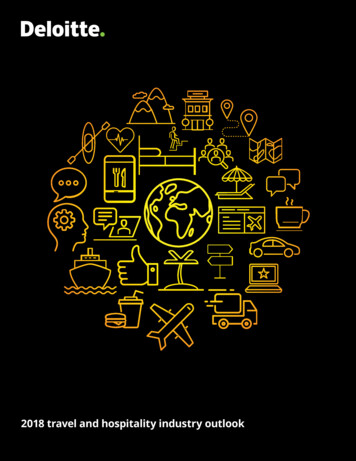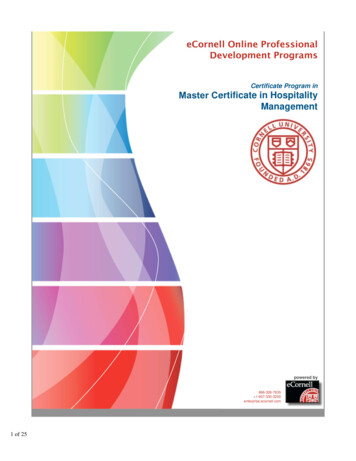
Transcription
eCornell Online ProfessionalDevelopment ProgramsCertificate Program inMaster Certificate in HospitalityManagementpowered by866-326-7635 1-607-330-3200enterprise.ecornell.com1 of 25
Certificate Program inMaster Certificate in Hospitality ManagementCertificate InformationThis certificate program is comprised of thefollowing 8 online courses, plus 15 electivecourses:HAME504: Understanding Team DynamicsHAME505: Facilitating Group DecisionsHAME506: Improving Personal andWorkgroup ProductivityHAME512: Managing People More EffectivelyHAME513: Understanding FinancialStatementsCertificate OverviewGain a robust understanding of the hospitality vertical to move into director level responsibilities atthe property site and corporate headquarters. Learn advanced hospitality management techniquesand valuable cross-disciplinary skills and principles.DescriptionHundreds of professionals who want to sharpen their existing skills, develop new skills, andenhance the understanding of their hospitality management career participate in executiveeducation programs from Cornell’s School of Hotel Administration annually. eCornell hasworked hand-in-hand with the School of Hotel Administration to adapt its renownedProfessional Development Series for convenient online delivery.HAME518: Creating Service CulturesHAME519: Secrets of Phenomenal CustomerServiceSHA501: Marketing Fundamentals for theHospitality IndustryElective CoursesHAME507: Mastering the Time Value of MoneyThe Master Certificate in Hospitality Management addresses the skills and competenciesrequired of employees ascending to management positions and those recently promoted tomanagement positions in the hospitality industry. The eight core courses cover valuabletechniques for managing time to increase efficiency and productivity, and managingteams to increase both the level of participation and the effectiveness of team members.Learn fundamental concepts and techniques related to marketing, financial analysis,and accounting. In short, these courses are designed to build a foundation of skills tohelp new managers succeed and to progress in the organization.HAME508: Making Capital Investment DecisionsCore Courses:HAME509: Risk and Return: How to Identify, Measure, andIncorporate Into Capital Budgeting DecisionsHAME510: Raising Capital: The Process, the Players, andStrategic ConsiderationsHAME514: Using Ratio Analysis to Evaluate FinancialPerformanceHAME515: Data Gathering and Analysis in the Hospitality IndustryHAME516: Statistical Decision Making for Hospitality ManagersSHA502: Conducting Effective Hospitality Marketing ResearchSHA503: The Hospitality Marketing Mix: Product and PriceSHA504: The Hospitality Marketing Mix: Place and PromotionSHA531: Introduction to Hotel Revenue ManagementSHA532: Forecasting and Availability Controls in Hotel RevenueManagementSHA533: Pricing Strategy and Distribution Channels in Hotel RevenueManagementSHA534: Overbooking Practices in Hotel Revenue ManagementSHA535: Non-Traditional Applications of Hotel Revenue ManagementAccreditationLearners who successfully complete this program receive a MasterCertificate in Hospitality Management Certificate from Cornell Universitypowered by2 of 25Marketing Fundamentals for the Hospitality IndustryUnderstanding Team DynamicsFacilitating Group DecisionsImproving Personal and Workgroup ProductivityManaging People More EffectivelyUnderstanding Financial StatementsCreating Service CulturesSecrets of Phenomenal Customer ServiceSelect two of the three elective tracks to get the additional in-depthMarketing, Finance, or Hotel Revenue knowledge you need tosucceed in your career.Who Should Enroll in This Certificate?This certificate series is designed for hospitality professionalswithin hotels and corporate offices seeking a comprehensiveunderstanding of the many facets of hospitality including finance,marketing, foodservice, human resources and revenuemanagement. It is also ideal for upper-level professionals movinginto executive level positions who wish to refine their skills inspecific hospitality areas.
Required Course:Understanding Team DynamicsHAME504Authoring FacultyFlorence Berger, Ph.D., Professor EmeritusJudi Brownell, Ph.D., ProfessorSponsoring SchoolCornell University's School of HotelAdministrationTotal Learning TimeApproximately five to six hours over a period oftwo weeks for each course.DescriptionIf organizations are to remain productive and maintain a competitive advantage in this fast-paced,constantly changing, global economy, it is essential that they understand how to create and utilizeeffective work teams at all levels of the organization. When well managed, teams improveproductivity, innovation, and the likelihood of success. Ineffective teams lead to frustration and theloss of time and productivity.In this course, participants will explore the dimensions and inherent benefits of a well-organized,synchronized team and how to develop a systematic and concrete approach to organizingindividuals into a highly effective, productive, and cohesive work force.Who Should Take This Course?This course is critical for all levels of managers, supervisors, and team leaders who need toorganize their employees into productive, innovative teams.Benefits to the LearnerAfter completing this course, you will be able to:Explain the principles of group dynamics and developmentDescribe the dimensions of team member behaviorAssess how effectively a team functionspowered by3 of 25
Required Course:Facilitating Group DecisionsHAME505Authoring FacultyFlorence Berger, Ph.D., Professor EmeritusJudi Brownell, Ph.D., ProfessorSponsoring SchoolCornell University's School of HotelAdministrationTotal Learning TimeApproximately five to six hours over a period oftwo weeks for each course.DescriptionIn a highly global market, organizations that have the ability to analyze and rapidly respond to theconstantly changing marketplace will have the greatest chance of remaining competitive andprofitable. This is greatly dependent upon work teams that are cohesive, flexible, and able torapidly arrive at important decisions. Group decision making provides for increased ability togather pertinent information, to develop creative solutions, and to generate new ideas.In this course, participants will explore the benefits inherent in group decision making and willlearn about models and techniques for efficient group decision making that lead to enhancedproductivity and organizational performance.Who Should Take This Course?This course is important for professionals who lead or manage teams, or aspire to, and seekto enhance team decision making to improve overall productivity.Benefits to the LearnerAfter completing this course, participants will be able to:Determine whether or not to employ group decision makingEvaluate the most appropriate decision-making method for a particularcircumstanceApply the techniques that improve and facilitate group decision makingFacilitate effective participation of team members in problem solvingImplement strategies to help groups arrive at the best decisionspowered by4 of 25
Required Course:Improving Personal and Workgroup ProductivityHAME506Authoring FacultyFlorence Berger, Ph.D., Professor EmeritusJudi W. Brownell, Ph.D., ProfessorSponsoring SchoolCornell University's School of HotelAdministrationTotal Learning TimeApproximately 5-6 hours over a period of twoweeks for each course.DescriptionIn a networked economy, the overload of information, tasks, and meetings, as well as the need tostay connected to colleagues in other time zones, often erodes productivity and effectiveness.Managers need the strategies and techniques for work prioritization and personal timemanagement that are so vital for success in today's demanding, multitasking workplace.Managers spend a significant amount of their day in meetings, so it is imperative that theyunderstand how to structure and run effective, productive meetings, and how to prioritize andmanage their own work loads. While meetings provide an opportunity for creative, high-qualitydiscussions and problem solving, they are often unproductive, leaving participants feelingstressed due to the perceived waste of precious time.In this course, participants will learn about the best practices for structuring their ownpersonal time and workload, and for leading efficient and successful meetings for increasedproductivity.Who Should Take This Course?This course is necessary for all managers, supervisors, and team leaders at any level ofthe organization and in any industry who want to learn to make their workdays moreproductive.Benefits to the LearnerAfter completing this course, participants will be able to:Identify and overcome personal tendencies that lead to procrastinationEfficiently prioritize tasks and events based on urgencyPlan and lead meetings that successfully disseminate relevantinformation and increase morale and productivitypowered by5 of 25
Required Course:Managing People More EffectivelyHAME512Authoring FacultyJudi Brownell Ph.D., Professor andFlorence Berger, Ph.D., Professor EmeritusSponsoring SchoolCornell University's School of HotelAdministrationTotal Learning TimeApproximately 3 to 6 hours over a period oftwo weeks for each course.DescriptionWe experience stress as a normal response to changes, demands, pressures, or threats. When wefail to deal effectively with stressful situations, we continue to experience the stress response,leading to tension. This course provides coping strategies and stress-reducing techniques thatmanagers and their employees can use—not only to improve their job performance but also togreatly reduce their risk of experiencing the harmful effects of ongoing stress.In the second part of the course, coaching techniques and exercises are presented. Counselingis an increasingly important skill for managers in the hospitality industry. Those managers whohave mastered the basic skills of coaching can improve productivity by serving as resources totheir colleagues and to their organization.This course looks at stress from the perspectives of both the individual and the organization.In it, you learn the different types and sources of stress and how people react to them. Youdevelop your ability to recognize the signs of stress so that you can manage stresseffectively. You discover the factors that determine an individual's ability to cope withstress. Additionally, you learn the steps of the counseling process, the signs that indicatethat an individual may need counseling, and the signs that indicate an individual mayrequire professional help.Who Should Take This Course?This course is designed for Hospitality professionals seeking to manage stress atany level of the organization.Benefits to the LearnerAfter completing this course, you will be able to:Recognize and manage your own stress-related symptomsRecognize signs and symptoms that indicate an employee may needyour help managing stress-related problems, or may needprofessionalhelpImplement appropriate and effective coaching strategiespowered by6 of 25
Required Course:Understanding Financial StatementsHAME513Authoring FacultySteven Carvell, Ph.D., Associate Professorand Associate Dean for Academic AffairsScott Gibson, Ph.D., Assistant ProfessorSponsoring SchoolCornell University's School of HotelAdministrationDescriptionIn order for organizations to succeed, leaders and managers must be able to accurately interpretand utilize financial reports. They must also be able to assess the overall financial performance ofthe organization, a particular department, or the competition, and then convey the organization'sfinancial condition to its constituents.In this course, participants will learn how to read and interpret income statements, balancesheets, and cash flow statements. By understanding the information contained in each of thesekey reports, participants will have a solid foundation upon which to base more advancedanalysis of their firm's financial performance.Total Learning TimeApproximately five to six hours over a period oftwo weeks for each course.Who Should Take This Course?This course is necessary for all professionals who deal with financial reports and need tounderstand how to accurately interpret and use the data to improve efficiency andproductivity for their department and organization.Benefits to the LearnerAfter completing this course, participants will be able to:Understand and interpret the information found in the three principle financialstatementsUnderstand how the three reports relate to one another and how they arecombined (with additional information) to serve as an annual reportWork with online sources of financial information to conduct research onotherpublicly-traded firms and industriesOther RequirementsParticipants in this course need one of the following financial calculators:Hewlett-Packard 12CTexas Instruments BA II PlusBoth are available for purchase directly from Amazon.com.powered by7 of 25
Required Course:Creating Service CulturesHAME518Authoring FacultyFlorence Berger, Ph.D., Professor EmeritusJudi Brownell, Ph.D., ProfessorSponsoring SchoolCornell University's School of HotelAdministrationTotal Learning TimeApproximately five to six hours over a period oftwo weeks for each course.DescriptionIn realizing the vision of phenomenal customer service, high-performing organizations focus first onserving and satisfying the customers within. This course helps managers establish a stronginternal service culture toward the goal of exceeding customer expectations. The courseemphasizes the methods of creating and maintaining an organizational culture that rewards andreinforces internal service behaviors. Participants learn how to select and develophigh-performing employees and how to set and maintain service standards.Who Should Take This Course?This course is invaluable for all those—from mid-level and high-potential managers toupper-level executives—charged with creating, implementing, and sustaining an internalservice culture as a strategy to drive future organizational success.Benefits to the LearnerAfter completing this course, participants will be able to:Discuss the nature and importance of intangible personal characteristics in thedeliveryof phenomenal serviceDescribe the variety of selection strategies available to identify service intangiblesClearly articulate service standards and communicate them throughout theorganizationCreate internal systems to maintain and continuously improve processesrelated to phenomenal serviceDiscuss the impact implementing the ideas from this course can have onyour organization’s service qualitypowered by8 of 25
Required Course:Secrets of Phenomenal Customer ServiceHAME519Authoring FacultyFlorence Berger, Ph.D., Professor EmeritusJudi Brownell, Ph.D., ProfessorSponsoring SchoolCornell University's School of HotelAdministrationTotal Learning TimeApproximately five to six hours over a period oftwo weeks for each course.DescriptionEvery employee is an important member of the service delivery team. Organizational membersmust work together to ensure consistent, high-quality customer service. Effectiveness requires thedevelopment of exceptional customer-service skills appropriate to the particular organization. Thiscourse prepares supervisors and managers to identify these key service requirements andimplement a variety of training methods to ensure the development and reinforcement of serviceattitudes and skills.Who Should Take This Course?This course is essential for everyone - from supervisors through upper-level and high-potentialmanagers - whose success depends on their and their employees’ ability to deliverphenomenal customer service.Benefits to the LearnerAfter completing this course, participants will be able to:Describe challenges confronting employees in the area of service communicationIdentify essential service skills specific to a particular positionDescribe the secrets of effective service communication: phenomenal verbalcommunication, nonverbal communication, and listening skillsAnalyze service encounters to better address specific customer needs andrequirementspowered by9 of 25
Required Course:Marketing Fundamentals for theHospitality IndustrySHA501Authoring FacultyJudy Siguaw, D.B.A.Sponsoring SchoolCornell University's School of HotelAdministrationTotal Learning TimeApproximately 3 to 6 hours over a period oftwo weeks for each course.DescriptionThe most important objective in your business is to identify and satisfy customers. This is theprimary role of marketing?a continuous process in which your ideas and analysis lead to actionsand results, generating further ideas and analysis. In the current era, in which competition isintense and demand is uncertain, a marketing orientation is vital to success. By focusing on theneeds of the customer, you are able to realize your sales goals and successfully compete in themarketplace.This course is designed to teach you the role and scope of marketing in an organization. Youinvestigate many of the core conditions and concepts around which successful marketing andproduct placement are centered. You find out which factors provide value for customers andlearn the essential principles of marketing that characterize the present era of marketorientation. You explore and apply these principles through the examination of several casestudies. You build your understanding of marketing and the development of marketingstrategies, so you can serve your customers and deal effectively with competitors.Who Should Take This Course?This course is designed for Hospitality professionals recently entering the marketingvenue and marketing professionals who seek to expand their understanding of therole of marketing.Benefits to the LearnerAfter completing this course you will be able to:Make clear and effective marketing choicesApply the fundamental concepts of marketing to the development of amarketing planpowered by10 of 25
Elective Course:Mastering the Time Value of MoneyHAME507Authoring FacultySteven Carvell, Ph.D., Associate Professorand Associate Dean for Academic AffairsScott Gibson, Ph.D., Assistant ProfessorSponsoring SchoolCornell University's School of HotelAdministrationTotal Learning TimeApproximately five to six hours over a period oftwo weeks for each course.DescriptionIn today's competitive business world, managers are charged with making many project-relateddecisions, often involving costs or revenues that will be encountered some time in the future.Managers need to have a fundamental understanding of the time value of money.In this course, participants develop a solid understanding of the time value of money. Usingtimelines and cash-flow calculations they will learn to project cash flow, calculate payments,establish the value of securities and investments, and determine when it is more cost effective tolease or to buy.Who Should Take This Course?This course is crucial for managers without a significant financial background who arecharged with project planning, purchasing decisions, and planning capital budgeting projects.Benefits to the LearnerAfter completing this course, participants will be able to:Make planning decisions in the present, based on the accurate calculation of cashflow projectionsUse a cash-flow timeline to conceptualize time-value-of-money problemsUse a financial calculator to solve time-value-of-money problemsCalculate present and future values of payments, perpetuities, and annuitiesUse these concepts as a foundation for making capital investment decisionsOther RequirementsParticipants in this course need one of the following financial calculators:Hewlett-Packard 12CTexas Instruments BA II PlusBoth are available for purchase directly from Amazon.com.powered by11 of 25
Elective Course:Making Capital Investment DecisionsHAME508Authoring FacultySteven Carvell, Ph.D., Associate Professorand Associate Dean for Academic AffairsSco
Certificate in Hospitality Management Certificate from Cornell University powered by Certificate Overview Gain a robust understanding of the hospitality vertical to move into director level responsibilities at the property site and corporate headq

